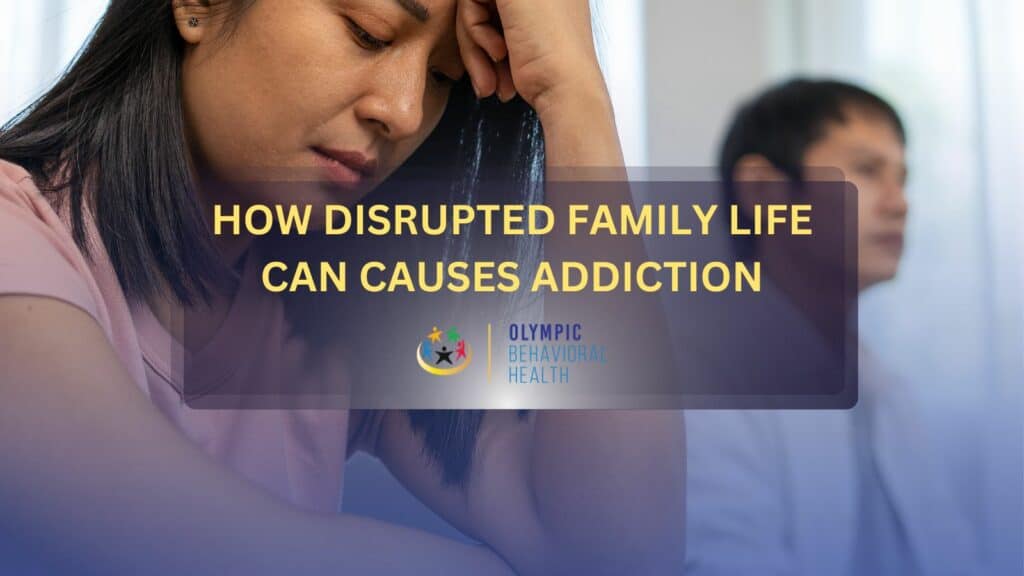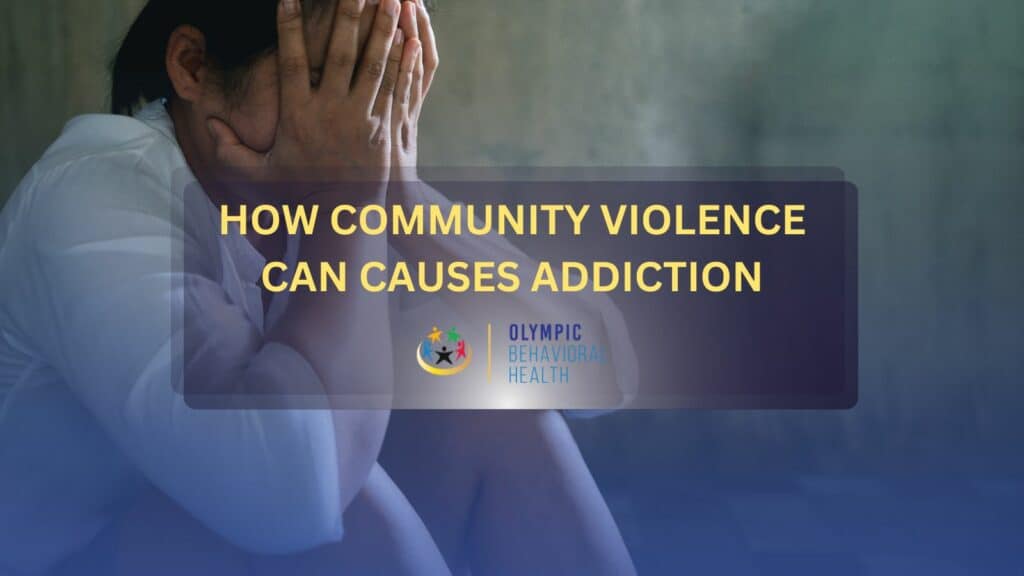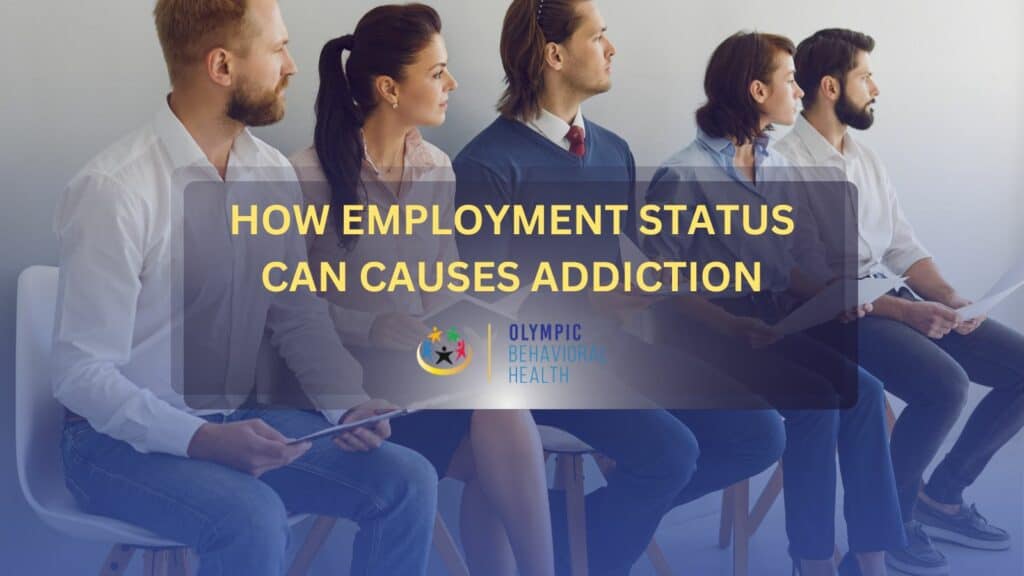Disrupted family life, characterized by instability, conflict, and lack of emotional support, can be a significant risk factor for developing an addiction. Statistics paint a concerning picture: according to the National Healthy Marriage Resource Center, roughly 40% of children in the US experience a parental divorce by the time they turn 18.
This, along with other factors like parental incarceration or substance abuse within the family, contributes to a growing number of children and adolescents raised in disrupted environments.
These environments can create a breeding ground for addiction. When children lack a sense of security and emotional connection at home, they may turn to substances or risky behaviors to cope with difficult emotions like loneliness, anxiety, or anger.
Studies by the Institute for Family Studies show that individuals who come from disrupted families are more likely to develop substance abuse problems compared to those raised in stable environments.
The reasons for this increased risk are multifaceted. Disrupted families may struggle to provide positive role models and healthy coping mechanisms for dealing with stress.
Additionally, the chaos and unpredictability of a dysfunctional home can make children more susceptible to peer pressure and risky behaviors, increasing the likelihood of them encountering and potentially experimenting with drugs or alcohol.
The long-term effects of a disrupted family life on addiction risk are concerning. While it doesn’t guarantee addiction, it creates a vulnerability that can be exploited in the absence of healthy coping mechanisms and robust support systems.
Fortunately, resources like therapy and support groups exist to help individuals and families address underlying issues and build resilience against addiction.
What is a Disrupted Family Life?
Disrupted family life describes a situation where the way a family typically functions is significantly thrown off balance. This can happen due to various events or circumstances.
Imagine a family dinner where everyone feels connected and communicates openly. Now imagine that replaced with constant tension, broken promises, and a sense of uncertainty. This is the reality for many families facing disruption.
Several vital signs of disrupted family life exist. One is a change in the family structure, which could be caused by events like divorce, a parent’s death, or even a child being removed from the home. While not inherently disrupted, blended families can also face challenges that impact family life.
Another sign is a lack of healthy communication. Open and honest communication is essential for any family, but in disrupted families, communication may be strained or even hostile. This can lead to misunderstandings, resentment, and feelings of isolation among family members.
Disrupted families may also experience an unstable or chaotic environment. This could involve frequent arguments, unpredictable routines, or a need for clear boundaries. This creates a stressful and insecure atmosphere for everyone in the family.
In some cases, disrupted families may involve emotional neglect or abuse. Emotional neglect occurs when children’s emotional needs are not met. In the worst cases, emotional or even physical abuse may be present.
It’s important to remember that disrupted family life exists on a spectrum. Some families may experience a single disruptive event, while others may face ongoing challenges. The severity of the disruption can also vary depending on the specific circumstances. Unfortunately, disrupted family life can have serious consequences. Children from disrupted families are more likely to experience mental health problems, substance abuse, academic difficulties, and social problems.
Can a Disrupted Family Life Cause Addiction?
“An Exploratory Research on the Role of Family in Youth’s Drug Addiction.” by Masood, Sobia, and Najam Us Sahar in 2014
This article dives into the complex relationship between family dynamics and drug addiction among young people in Pakistan. The authors wanted to understand how communication styles and family life influence young people to turn to drugs.
The researchers interviewed 20 participants in drug rehabilitation centers. Most of the participants admitted to using multiple substances and blamed peer pressure and curiosity as their initial reasons for trying drugs. Interestingly, the study found that while parents expressed concern about their children’s well-being, they struggled to set and enforce clear rules.
Pakistani society is collectivistic, which means families are typically close-knit, and significant choices are made collaboratively. Fathers are traditionally seen as the authoritarian figures in the household. The study suggests that weak communication between parents and children, along with a lack of problem-solving skills, could be contributing factors to youth drug use.
The impact of substance use disorders on families and children: from theory to practice. By Lander L, Howsare J, Byrne M. (2013)
Substance use disorders (SUDs) aren’t just individual problems – they wreak havoc on the entire family. This article dives into the research behind the impact of SUDs on families and children, highlighting the importance of support and intervention.
The researchers show how SUDs disrupt family life, communication, roles, and routines. Children are particularly vulnerable. Witnessing addiction can cause immense emotional distress and confusion, and they may be more likely to develop mental health problems or substance abuse issues themselves.
But there’s hope. The article explores how therapists can utilize family systems theory and attachment theory to understand the family dynamics affected by SUDs. Social workers can also play a vital role by providing education therapy and connecting families with treatment resources.
Family functioning in families with alcohol and other drug addiction by Gabriele Schäfer in 2011
The article discusses the adverse effects of addiction on families in New Zealand. The study looked at families struggling with alcohol and other drug addictions. Many participants in the survey had experienced childhood trauma and abuse. This trauma was identified as a contributing factor to addiction for many participants. The article also highlights how addiction strains relationships within families. Some parents reported neglecting or abusing their children, while others expressed worry that their children would develop addictions themselves.
Challenges in addiction-affected families: a systematic review of qualitative studies by Mardani M, Alipour F, et al. in 2023
The article explores the challenges faced by families of people with an addiction. It examines the impact of addiction on various aspects of family life, including social isolation, emotional strain, and financial difficulties.
The article identifies five key themes:
- Initial Shock: The discovery of addiction in a loved one can be a devastating blow, causing feelings of shock, disbelief, and anger.
- Social Isolation: Families with addiction often experience social isolation due to stigma and shame. They may withdraw from friends, extended family, and social activities.
- Emotional Decline: Addiction can take a significant emotional toll on family members. They may experience feelings of anxiety, depression, and helplessness.
- Internal Family Chaos: The addiction can disrupt family dynamics, leading to arguments, blame, and a constant sense of uncertainty.
- Self-Protection: In an attempt to cope with the addiction, family members may develop self-protective behaviors, such as denial or enabling.
The article highlights the importance of support groups and therapy for families struggling with addiction. These resources can help families cope with emotional challenges and develop healthy coping mechanisms.
Highlights of the Studies
As seen in the studies above, there is a well-established connection between disrupted family life and addiction. Studies suggest that a chaotic or dysfunctional family environment can increase a person’s risk of developing an addiction to substances or behaviors.
Here’s a look at how disrupted family life can be a risk factor for addiction:
- Stress and Emotional Trauma: Disrupted families can be a source of chronic stress and emotional trauma for children and adolescents. These experiences can make them more susceptible to self-medication through substances or addictive behaviors to cope with difficult emotions.
- Lack of Support and Connection: Families with addiction issues may struggle to provide a supportive and connected environment. This lack of emotional support can increase feelings of isolation and loneliness, further pushing individuals towards addiction.
- Modeling of Risky Behaviors: If a parent or close family member struggles with addiction, children are more likely to witness and be exposed to these behaviors. This can lead them to believe that addiction is a standard coping mechanism.
While a disrupted family life can be a risk factor, it’s important to note that it doesn’t guarantee addiction. Other factors like genetics and mental health also play a significant role.
Can early exposure cause addiction?
Yes, early exposure to certain substances or behaviors can increase the risk for addiction later in life. Studies have found that children who grow up in homes with substance abuse, neglect, or other forms of disrupted family life are more likely to develop addiction issues themselves. This can be due to a combination of genetic, environmental, and learned factors.
Can a bad employment status cause addiction?
Yes, a bad employment status can be a contributing factor to addiction. Studies have shown that unemployment or job dissatisfaction can lead to stress, depression, and feelings of worthlessness, which can increase the risk of turning to substances for relief.
In addition, job loss can also disrupt family life and relationships, leading to further emotional distress that may drive individuals towards addiction.

Share This Post



